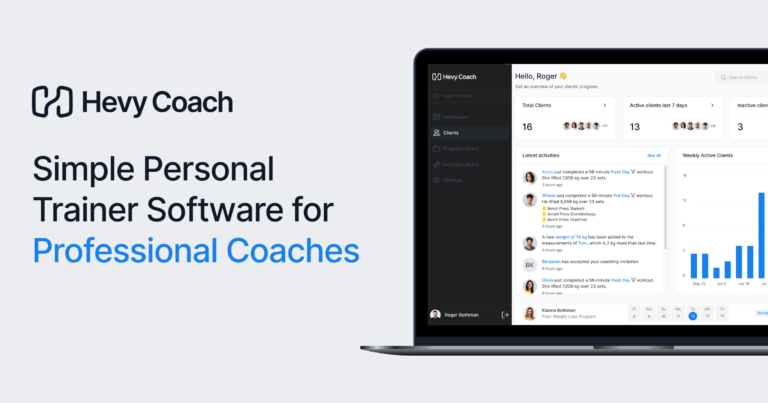The terms fitness coach and personal trainer are often used interchangeably, but they mean different things.
Read on if you’re interested in learning how the two differ, what responsibilities the two roles bring, and which one might make more sense as a career path.
Let’s dive in.
The Difference Between a Personal Trainer and a Fitness Coach
Personal trainers focus on training: writing tailored programs, teaching proper form, monitoring clients during workouts, and helping them reach their fitness goals. Fitness coaches take a holistic approach to help clients make lasting lifestyle changes, guiding them in their exercise routine, nutrition, and daily decision-making.
Personal Trainer: Roles, Qualifications, and More
Personal trainers are fitness professionals who guide their clients through structured exercise programs.
While not required by law, aspiring fitness professionals should earn their certification from the NCSA, ACE, ISSA, or a similar reputable organization. Going through a certification program allows trainers to create a foundation of knowledge and expertise in exercise science. It also leads to more and better job opportunities and fosters trust with prospective clients.
The primary responsibilities of a personal trainer are:
- Program design. Personal trainers must consider their client’s training and injury history, goals, preferences, limitations, and lifestyle to create tailored workout programs for muscle and strength gain, healthy weight loss, and overall health.
- Technique instructions. A trainer must stay close to the client during training sessions to instruct them how to perform each movement, teach them about common errors, and ensure the trainee lifts weights with good form.
- Ensuring safety. Coaches and personal trainers must provide a safe training environment for their clients by helping them warm up, set up for each exercise, pick the correct load, and train through the appropriate range of motion.
- Motivation and accountability. Keeping clients engaged and interested in the training process is an underrated responsibility of personal trainers. A good coach knows how to motivate clients and hold them accountable to ensure adherence at the gym.
- Tracking progress. Good personal training means keeping track of clients and what they are doing in their training. You must know how their training is going and how much effort they put into each set.
Hevy Coach is an all-in-one platform for personal trainers and coaches. You can write programs, answer questions, and track how your clients are doing in their training, all from a single dashboard.

Try Hevy Coach
Intuitive personal trainer software, with a world class experience for your clients.
30 day free trial, no credit card required
Fitness Coach: Roles, Qualifications, and More
A fitness coach, also known as a health and wellness coach, is a fitness professional who guides clients to good health and well-being. Fitness coaches take a more holistic approach instead of focusing on one thing.
Many fitness coaches hold a degree in exercise science, nutrition, kinesiology, or a similar field, though one is not mandatory for the job.
That said, fitness coaching requires a certification. For example, ISSA has a personal trainer certification program that includes a fitness certification focusing on nutrition, corrective exercise, bodybuilding, etc.
Some of the roles of fitness coaches include:
- Providing a holistic plan. One of the primary objectives of fitness coaches is to provide a comprehensive plan for a healthy lifestyle. Areas of focus include training, nutrition, sleep, and stress management.
- Emphasizing personal development. Fitness coaches educate their clients on multiple aspects of good health instead of focusing on specific fitness goals. Rather than chase a specific objective, the goal is to help people grow as a whole.
- Tracking progress. Despite not prioritizing fitness goals, coaches monitor their clients to see if they are moving in the right direction. A good fitness instructor will ask clients about their sleep habits, nutrition, and stress management because these affect workout results.
- Helping clients set goals. While not a top priority, a fitness trainer will help clients set clear, actionable, specific, and time-bound goals in various areas of life.
- Offering support and motivation. Like personal trainers, fitness coaches provide ongoing support and encouragement to keep their clients engaged and eager to continue on the path of self-development.
Related article: How to Become a Personal Trainer in 2024: The Ultimate Guide
Similarities Between Fitness Coaches and Personal Trainers
You’ve probably noticed similarities between personal training and fitness coaching from the above information. Still, let’s break them down:
1. Client-Centered Approach
Personal trainers and fitness coaches place their clients first and do everything to provide excellent service and help them reach their long-term goals.
A trainer’s objective is to help their clients succeed, and their track record determines their reputation in the fitness industry.

2. Health and Fitness Education
Both professions require a great understanding of health and fitness to be successful and serve their clients as best as possible.
Fitness coaches pay more attention to healthy lifestyle habits, but personal trainers must also understand the fundamentals of healthy nutrition, stress management, and sleep to set themselves apart.
3. Goal-Setting
Fitness coaches and personal trainers must understand how goal-setting works and help clients set clear, realistic, and time-bound objectives. Doing so keeps clients more engaged and improves retention rates.
4. Motivation and Support
Health and fitness professionals must learn to communicate effectively with each client, regardless of their goals and starting point.
A great coach or PT knows how to motivate clients, support them on their journey, and help them persevere through challenges.
5. Continuous Improvement
Fitness coaching and personal training are two professions heavily dependent on continuous improvement. To make it in the fitness industry and stay on top, you must stay up-to-date with the latest developments in exercise science, nutrition, and related fields.
As a fitness professional, you must continually learn new things and earn continuing education units (CEUs) to remain certified. For example, ISSA requires fitness trainers to get 20 CEUs every two years to stay in the program.
Differences Between Fitness Coaches and Personal Trainers
While fitness coaches and personal trainers share similarities, the two professions are also fundamentally different in a few ways:

1. Overall Approach
Where a fitness coach focuses on helping clients lead a healthy lifestyle, a personal trainer prioritizes proper guidance in the gym:
- Creating an effective training program based on many factors
- Monitoring each client to optimize exercise form and ensure they are working hard
- Tracking progress to ensure continual improvements (strength, endurance, mobility, etc.)
2. Communication Style
Personal trainers mostly communicate with their clients during one-on-one sessions. Interaction outside the gym is typically limited to scheduling or re-scheduling upcoming workouts.
In contrast, fitness coaches often communicate with clients outside the gym (via chat, email, video calls, etc.) to help them make better decisions in their daily life.
3. Problem-Solving
A personal trainer will generally use their extensive knowledge in exercise science to help clients overcome specific issues or achieve goals (e.g., lose weight). For example, if a client wants to build muscle, a PT would write a hypertrophy-focused training plan.
However, fitness coaches often use a broader range of problem-solving skills to help clients reach their goals more efficiently. A coach can help clients with a wide range of issues, including:
- Learning to navigate social events without over-eating
- Developing a healthy bedtime routine for better sleep
- Reducing the number of cigarettes the client smokes
Of course, a fitness coach won’t be able to help everyone––specialized help is sometimes necessary. For example, if a person struggles with binge eating, they might have to look into cognitive behavioral therapy (CBT) or another form of specialized support.

Try Hevy Coach
Intuitive personal trainer software, with a world class experience for your clients.
30 day free trial, no credit card required
Fitness Coach vs. Personal Trainer: Which is Right for You?
At first glance, you might be inclined to pick fitness coaching or personal training as your career path, which makes sense. After all, the two professions are different in some fundamental ways.
However, in today’s competitive job market, you must find a way to stand out and convince people that you are the only fitness professional they need.
To that end, we could argue that the ideal thing to do is become a fitness coach and personal trainer. Instead of doing one or the other, pick the best things from both professions to serve your clients better and help them reach their goals.
In other words, consider a hybrid approach and seek certification programs that equip you with the knowledge and expertise you need to help clients in many ways:
- Gym training and programming
- Nutrition and dieting
- Lifestyle (habits, stress management, etc.)
You can look to the reputable certification programs to see what they offer. For example:
- ISSA offers a personal trainer certification with a fitness certification upgrade
- ACE offers a health coaching certification
- NASM offers several fitness certifications (personal training, nutrition, wellness, etc.)
Related article: How Much Does it Cost to Become a Personal Trainer in 2023?
Conclusion
A personal trainer uses their expertise and knowledge at the gym to write personalized training plans, support clients during each workout, and monitor their progress.
In contrast, a fitness coach takes a more holistic approach to helping clients. To achieve that, coaches guide people in their training but also help them with nutrition, stress management, sleep, breaking bad habits, and more.
While the two professions are different in some ways, fitness professionals should consider a hybrid approach, taking the best of both practices to provide superior service and set themselves apart.
Having the right tools can help you provide superior service and set you apart from your competition. Check out Hevy Coach––an all-in-one platform for coaches and personal trainers. You can write and deliver programs to clients, make adjustments when necessary, track progress and adherence, and answer questions, all from a single dashboard.




